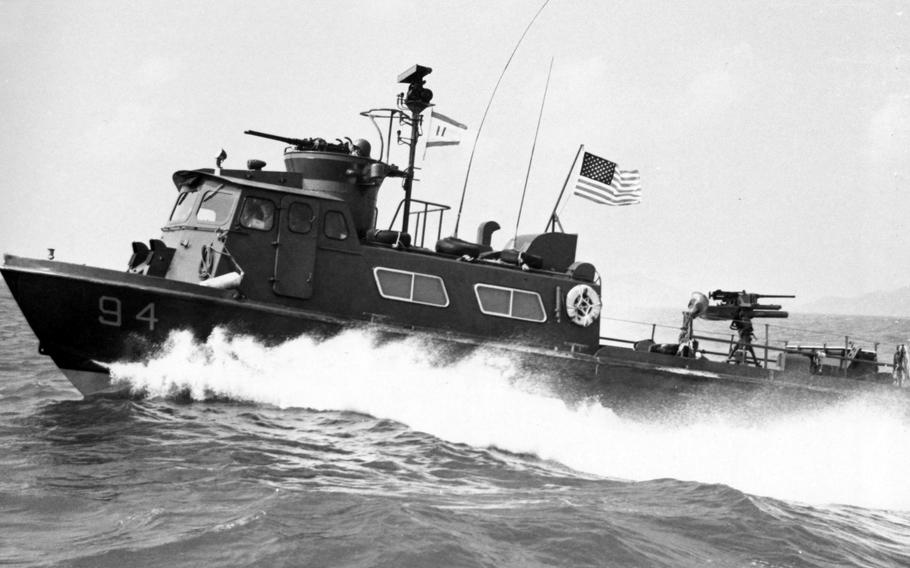
A U.S. Navy fast coastal patrol boat cuts through the Gulf of Thailand during a patrol to prevent the infiltration of Viet Cong and their supplies by sea in March 1968. (U.S. Navy)
The Department of Veterans Affairs shelled out about $201 million in retroactive benefits over the past two years to nearly 7,000 “blue water” Navy Vietnam War veterans and their survivors in connection to exposure to Agent Orange, a veterans advocacy group said Monday.
The VA recently informed the National Veterans Legal Services Program that since 2021 it had paid that amount in back benefits to 6,922 Navy veterans who served on ships in open sea off the shore of Vietnam, the NVLSP said in a news release.
The veterans group had taken the VA to court in 2020 seeking the retroactive benefits.
The payment report was among the other requirements in a Nov. 5, 2020, ruling by the U.S. District Court for Northern California in favor of thousands of veterans who were exposed to the defoliant Agent Orange while serving on ships within 12 nautical miles of Vietnam.
U.S. forces fought in South and North Vietnam from the early 1960s until 1973.
The U.S. sprayed just over 11 million gallons of Agent Orange to defoliate jungle during the extended war. The chemical caused multi-generational birth defects to Vietnamese inhabitants and a host of diseases among U.S. veterans who had been exposed during service.
NVLSP attorneys filed suit against the VA in 1986 challenging, among other things, the agency’s regulation maintaining that only chloracne, a rare skin disease caused by exposure to dioxins, was associated with exposures to Agent Orange and other herbicides used during the war.
A federal court invalidated that regulation in 1989, as well as all decisions made by the VA based on it.
In 1991, the veterans’ attorneys negotiated a consent decree with the VA that requires the agency to recognize emerging scientific evidence about the effects of Agent Orange exposure.
The VA must also identify previously denied claims involving newly recognized diseases and pay disability and death benefits retroactive to the date of the claims.
In the decades since that consent decree, medical research has found a positive association between Agent Orange exposure and about a dozen forms of cancer, diabetes, ischemic heart disease and Parkinson’s.
Those links have led to the VA paying out about $4.9 billion in retroactive disability and death benefits “to hundreds of thousands of Vietnam veterans and their surviving family members,” the news release said.
Congress passed the Blue Water Navy Vietnam Veterans Act in 2019, which granted a presumption that veterans who served on ships off the Vietnam coast were exposed to Agent Orange and other herbicides.
But that legislation did not require the VA to automatically assess whether a veteran or survivor was entitled to retroactive compensation due to a prior denial.
Under the 2019 law, back compensation was triggered only if a veteran or survivor files a claim after Jan. 1, 2020, and specifically identifies the Agent Orange-related disease that was the subject of the earlier denied claim.
The law also did not require the VA to pay retroactive compensation if the blue water Vietnam veteran had been wrongly denied but is now dead.
In July 2020, NVLSP filed a motion in federal court on behalf of thousands of blue water veterans and their survivors arguing that the terms negotiated under the 1991 consent decree had been breached in light of the provisions of the Blue Water Navy Vietnam Veterans Act.
Four months later in November 2020, the federal court ordered the VA “to automatically readjudicate thousands of benefits claims that the Court found had been wrongly denied under the Consent Decree,” the news release said.